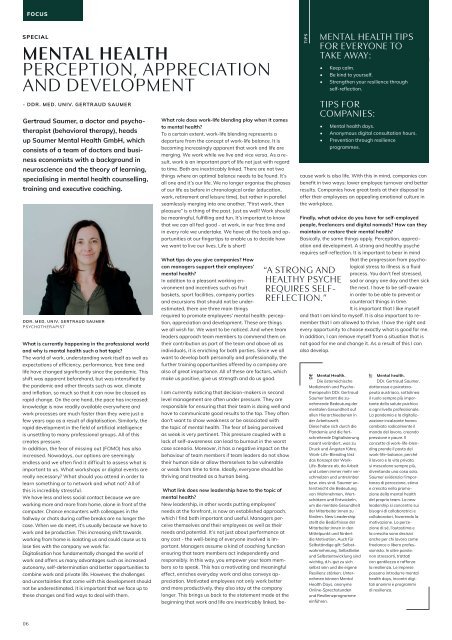AMAgazine #3
What keeps us busy and where we want to go in the future. Take a look behind the scenes of AMA Stay, find insider tips about the Dolomites and inspiration for everything you love in the AMAgazine, published once a season.
What keeps us busy and where we want to go in the future. Take a look behind the scenes of AMA Stay, find insider tips about the Dolomites and inspiration for everything you love in the AMAgazine, published once a season.
You also want an ePaper? Increase the reach of your titles
YUMPU automatically turns print PDFs into web optimized ePapers that Google loves.
FOCUS<br />
PAGE 02<br />
SPECIAL<br />
MENTAL HEALTH<br />
PERCEPTION, APPRECIATION<br />
AND DEVELOPMENT<br />
- DDR. MED. UNIV. GERTRAUD SAUMER<br />
Gertraud Saumer, a doctor and psychotherapist<br />
(behavioral therapy), heads<br />
up Saumer Mental Health GmbH, which<br />
consists of a team of doctors and business<br />
economists with a background in<br />
neuroscience and the theory of learning,<br />
specialising in mental health counselling,<br />
training and executive coaching.<br />
DDR. MED. UNIV. GERTRAUD SAUMER<br />
PSYCHOTHERAPIST<br />
What is currently happening in the professional world<br />
and why is mental health such a hot topic?<br />
The world of work, understanding work itself as well as<br />
expectations of efficiency, performance, free time and<br />
life have changed significantly since the pandemic. This<br />
shift was apparent beforehand, but was intensified by<br />
the pandemic and other threats such as war, climate<br />
and inflation, so much so that it can now be classed as<br />
rapid change. On the one hand, the pace has increased:<br />
knowledge is now readily available everywhere and<br />
work processes are much faster than they were just a<br />
few years ago as a result of digitalisation. Similarly, the<br />
rapid development in the field of artificial intelligence<br />
is unsettling to many professional groups. All of this<br />
creates pressure.<br />
In addition, the fear of missing out (FOMO) has also<br />
increased. Nowadays, our options are seemingly<br />
endless and we often find it difficult to assess what is<br />
important to us. What workshops or digital events are<br />
really necessary? What should you attend in order to<br />
learn something or to network and what not? All of<br />
this is incredibly stressful.<br />
We have less and less social contact because we are<br />
working more and more from home, alone in front of the<br />
computer. Chance encounters with colleagues in the<br />
hallway or chats during coffee breaks are no longer the<br />
case. When we do meet, it’s usually because we have to<br />
work and be productive. This increasing shift towards<br />
working from home is isolating us and could cause us to<br />
lose ties with the company we work for.<br />
Digitalisation has fundamentally changed the world of<br />
work and offers us many advantages such as increased<br />
autonomy, self-determination and better opportunities to<br />
combine work and private life. However, the challenges<br />
and uncertainties that come with this development should<br />
not be underestimated. It is important that we face up to<br />
these changes and find ways to deal with them.<br />
What role does work-life blending play when it comes<br />
to mental health?<br />
To a certain extent, work-life blending represents a<br />
departure from the concept of work-life balance. It is<br />
becoming increasingly apparent that work and life are<br />
merging. We work while we live and vice versa. As a result,<br />
work is an important part of life not just with regard<br />
to time. Both are inextricably linked. There are not two<br />
things where an optimal balance needs to be found. It’s<br />
all one and it’s our life. We no longer organise the phases<br />
of our life as before in chronological order (education,<br />
work, retirement and leisure time), but rather in parallel<br />
seamlessly merging into one another. “First work, then<br />
pleasure” is a thing of the past. Just as well! Work should<br />
be meaningful, fulfilling and fun. It’s important to know<br />
that we can all feel good - at work, in our free time and<br />
in every role we undertake. We have all the tools and opportunities<br />
at our fingertips to enable us to decide how<br />
we want to live our lives. Life is short!<br />
What tips do you give companies? How<br />
can managers support their employees’<br />
mental health?<br />
In addition to a pleasant working environment<br />
and incentives such as fruit<br />
baskets, sport facilities, company parties<br />
and excursions that should not be underestimated,<br />
there are three main things<br />
required to promote employees’ mental health: perception,<br />
appreciation and development. These are things<br />
we all wish for. We want to be noticed. And when team<br />
leaders approach team members to commend them on<br />
their contribution as part of the team and above all as<br />
individuals, it is enriching for both parties. Since we all<br />
want to develop both personally and professionally, the<br />
further training opportunities offered by a company are<br />
also of great importance. All of these are factors, which<br />
make us positive, give us strength and do us good.<br />
I am currently noticing that decision-makers in second<br />
level management are often under pressure. They are<br />
responsible for ensuring that their team is doing well and<br />
have to communicate good results to the top. They often<br />
don’t want to show weakness or be associated with<br />
the topic of mental health. The fear of being perceived<br />
as weak is very pertinent. This pressure coupled with a<br />
lack of self-awareness can lead to burnout in the worst<br />
case scenario. Moreover, it has a negative impact on the<br />
behaviour of team members if team leaders do not show<br />
their human side or allow themselves to be vulnerable<br />
or weak from time to time. Ideally, everyone should be<br />
thriving and treated as a human being.<br />
What link does new leadership have to the topic of<br />
mental health?<br />
New leadership, in other words putting employees’<br />
needs at the forefront, is now an established approach,<br />
which I find both important and useful. Managers perceive<br />
themselves and their employees as well as their<br />
needs and potential. It’s not just about performance at<br />
any cost - the well-being of everyone involved is important.<br />
Managers assume a kind of coaching function<br />
ensuring that team members act independently and<br />
responsibly. In this way, you empower your team members<br />
so to speak. This has a motivating and meaningful<br />
effect, enriches everyday work and also conveys appreciation.<br />
Motivated employees not only work better<br />
and more productively, they also stay at the company<br />
longer. This brings us back to the statement made at the<br />
beginning that work and life are inextricably linked, be-<br />
TIPS<br />
ggf- kürzen,<br />
dass<br />
Infobox + Zusammenfassung<br />
auf<br />
1 Seite<br />
cause work is also life. With this in mind, companies can<br />
benefit in two ways: lower employee turnover and better<br />
results. Companies have great tools at their disposal to<br />
offer their employees an appealing emotional culture in<br />
the workplace.<br />
“A STRONG AND<br />
HEALTHY PSYCHE<br />
REQUIRES SELF-<br />
REFLECTION.”<br />
MENTAL HEALTH TIPS<br />
FOR EVERYONE TO<br />
TAKE AWAY:<br />
• Keep calm.<br />
• Be kind to yourself.<br />
• Strengthen your resilience through<br />
self-reflection.<br />
TIPS FOR<br />
COMPANIES:<br />
• Mental health days.<br />
• Anonymous digital consultation hours.<br />
• Prevention through resilience<br />
programmes.<br />
Finally, what advice do you have for self-employed<br />
people, freelancers and digital nomads? How can they<br />
maintain or restore their mental health?<br />
Basically, the same things apply. Perception, appreciation<br />
and development. A strong and healthy psyche<br />
requires self-reflection. It is important to bear in mind<br />
that the progression from psychological<br />
stress to illness is a fluid<br />
process. You don’t feel stressed,<br />
sad or angry one day and then sick<br />
the next. I have to be self-aware<br />
in order to be able to prevent or<br />
counteract things in time.<br />
It is important that I like myself<br />
and that I am kind to myself. It is also important to remember<br />
that I am allowed to thrive. I have the right and<br />
every opportunity to choose exactly what is good for me.<br />
In addition, I can remove myself from a situation that is<br />
not good for me and change it. As a result of this I can<br />
also develop.<br />
Mental Health.<br />
Die österreichische<br />
Medizinerin und Psychotherapeutin<br />
DDr. Gertraud<br />
Saumer betont die zunehmende<br />
Bedeutung der<br />
mentalen Gesundheit auf<br />
allen Hierarchieebenen in<br />
der Arbeitswelt.<br />
Diese habe sich durch die<br />
Pandemie und die fortschreitende<br />
Digitalisierung<br />
rasant verändert, was zu<br />
Druck und Ängsten führe.<br />
Work-Life-Blending löst<br />
das Konzept der Work-<br />
Life-Balance ab, da Arbeit<br />
und Leben immer mehr verschmelzen<br />
und untrennbar<br />
bzw. eins sind. Saumer unterstreicht<br />
die Bedeutung<br />
von Wahrnehmen, Wertschätzen<br />
und Entwickeln,<br />
um die mentale Gesundheit<br />
der Mitarbeiter:innen zu<br />
fördern. New Leadership<br />
stellt die Bedürfnisse der<br />
Mitarbeiter:innen in den<br />
Mittelpunkt und fördert<br />
die Motivation. Auch für<br />
Selbständige gilt: Selbstwahrnehmung,<br />
Selbstliebe<br />
und Selbstentwicklung sind<br />
wichtig, d.h. gut zu sich<br />
selbst sein und die eigene<br />
Resilienz stärken. Unternehmen<br />
können Mental<br />
Health Days, anonyme<br />
Online-Sprechstunden<br />
und Resilienzprogramme<br />
einführen.<br />
DE<br />
Mental health.<br />
DDr. Gertraud Saumer,<br />
dottoressa e psicoterapeuta<br />
austriaca, sottolinea<br />
il ruolo sempre più importante<br />
della salute psichica<br />
a ogni livello professionale.<br />
La pandemia e la digitalizzazione<br />
incalzante hanno<br />
cambiato radicalmente il<br />
mondo del lavoro, creando<br />
pressione e paure. Il<br />
concetto di work-life-blending<br />
prende il posto del<br />
work-life-balance, perché<br />
il lavoro e la vita privata<br />
si mescolano sempre più,<br />
diventando una cosa sola.<br />
Saumer evidenzia l’importanza<br />
di percezione, stima<br />
e crescita nella promozione<br />
della mental health<br />
del proprio team. La new<br />
leadership si concentra sui<br />
bisogni di collaboratrici e<br />
collaboratori, favorendo la<br />
motivazione. La percezione<br />
di sé, l’autostima e<br />
la crescita sono decisivi<br />
anche per chi lavora come<br />
freelance o libero professionista.<br />
In altre parole:<br />
non stressarti, trattati<br />
con gentilezza e rafforza<br />
la resilienza. Le imprese<br />
possono introdurre mental<br />
health days, incontri digitali<br />
anonimi e programmi<br />
di resilienza.<br />
IT<br />
06




